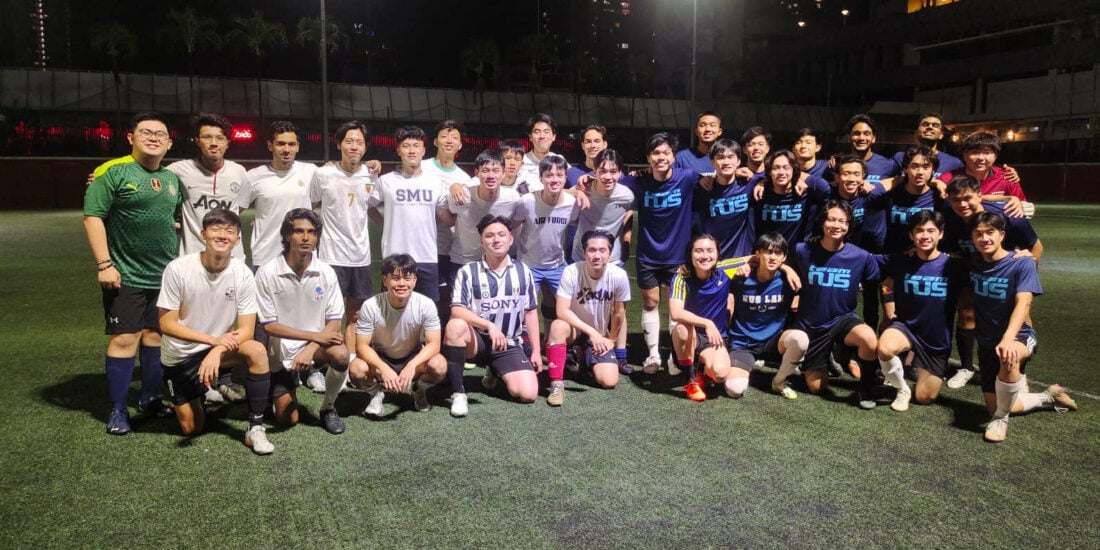
60th AIJA Annual Congress: The Future of the Legal Profession
The Association Internationale des Jeunes Avocats (AIJA), which translates from French to the International Association of Young Lawyers is the only global association for young lawyers and in-house counsel aged 45 and under.
Under the generous sponsorship of the Law Society of Singapore, from 22 to 27 August 2022, I was privileged to attend AIJA’s 60th Annual Congress (the Congress) held in Singapore.
Despite not having heard of AIJA before attending the Congress, I soon learned of its far reach, with 4,000 members from 90 different countries, including over 60 collective members and Bar Associations.1AIJA | About AIJA
AIJA’s Annual Congress is its flagship event where members gather to discuss issues centered around a theme and to network.
This year’s Congress theme was: “The Future of the Legal Profession”.
The pace of change of the legal profession has been accelerated by the pandemic and this theme sought to encourage members to anticipate the changes that the future will bring, and to embrace the change.
With a view of kickstarting this conversation, 15 academic sessions were organised that sought to enlighten participants on some of these changes.
Owing to space constraints, this article will focus on insights from four of these sessions.
Future of Technology and its Legal Implications
Right from the first academic session, Dan Jasnow from ArentFox Schiff in New York, gave an eye-opening look into the future.
With participants gathered in person, Dan joined us from New York as an avatar in Decentraland, a Metaverse platform.
Dan shared that ArentFox Schiff had purchased an office in Decentraland, becoming the first law firm to purchase space on metaverse, spending real world money on virtual space!2Major law firm buys property in the metaverse and opens virtual office (abajournal.com)

Dan’s Avatar showing us around Decentraland
Dan explained that Decentraland, like other Metaverses, is a product of Web3 Internet. Web3 internet is the next iteration of the Internet. This is where users own their content as opposed to merely seeing content (Web1 Internet) or creating content (Web2 Internet).3Web 2 vs. Web 3: What’s the Difference and Why It Matters | Spiceworks It Security This development is driven by the decentralisation brought about by blockchains.

Dan explaining the differences between Web2 and Web3 Internet
Dan focussed on four of the legal implications of Web3 internet.
New Legal Vehicle – DAO
Dan shared that blockchain technology has brought about the advent of a new legal vehicle, Decentralised Autonomous Organisations (DAOs).
Members are the token holders of a DAO.4Decentralized Autonomous Organization (DAO): Definition, Purpose, and Example (investopedia.com) DAOs have no central governing body, with members of a DAO all having a stake in its decision making. DAOs rely on logically coded agreements (Smart Contracts) that dictate the actions of the DAO based on the outcome of decisions made by votes of members of the DAO. Each decision of a DAO is made with all members having had an opportunity to vote. This affords a bottom-up management approach meant to address the principal-agent dilemma presented by a conventional board of directors making decisions on behalf of members of a company.
After reading about DAOs further, it was not clear to me how DAOs will be regulated in Singapore5Samuel Chan, “Event Note: Digitalisation and Decentralisation: The Future of Corporations” (21 October 2021) (http://www.singaporelawblog.sg/blog/article/273) given that the present treatment of existing business vehicles do not seem well suited to DAOs.6Wei Rong Chua, “The Legal Status of Daos in Singapore: Company, Partnership, or Business Trust?” 38 SLR 213 (2020-2021) Nevertheless, this is an exciting innovation that presents another way for people to structure businesses and is something that we as practitioners can consider when advising clients.
Novel Asset Classes
Dan went on to share that in granting the first injunction in the world to protect a Non-Fungible Token (an NFT), in a purely commercial dispute,7Withers obtains Asia’s first NFT freezing injunction (withersworldwide.com) the Singapore High Court had recognised that NFTs could legally be defined as property.
In my opinion this is but one of the many decisions that show the Singapore Judiciary’s willingness to develop our jurisprudence in line with technological developments. This can only enhance Singapore’s reputation as a future-ready legal hub. This, in turn, will lead to more technology-based businesses choosing to re-locate here. This will be especially so given the greater mobility that businesses nowadays have in relocating to favourable jurisdictions.
Service via Novel Means
Dan next shared that given the natural identities of defendants are often unknown in crypto disputes, unique methods of service of process have been deployed. For instance, in a recent case in New York,8LCX AG v John Doe Nos 1 -25 et. Al Order to Show Cause 46 (hklaw.com) service of cause papers via a special-purpose Ethereum based cryptocurrency token was permitted. The token, which contained a hyperlink to a website where the cause papers had been published, was served on the blockchain wallet address of the defendant. The hyperlink in turn contained a mechanism to track when a person had clicked on the hyperlink.
In my view, while ground-breaking in that this was not one of the conventional methods of service, this was a necessary development that is to be welcomed. Regardless of the means of service, the objective of service requirements has always been to ensure that the counterpart has notice of the proceedings. So long as the Court can be satisfied that notice will likely be given, even if the proposed service method is novel, it should be permitted.
Jurisdictional Considerations
Dan further shared that a legal concern arising from decentralisation of ownership by users is that there may be jurisdictional issues since there is no physical manifestation of the NFT.
This concern was aptly summarised by the English High Court in Osbourne9Osbourne v Persons Unknown & Anor (2022) EWHC 1021 (Comm) (10 March 2022) (bailii.org) at (14) as follows:
“… [N]on-fungible tokens [are] in effect a stream of electrons resulting in a credit item to a crypto account. As such, insofar as they have a physical manifestation at all, that is likely to be where the servers relevant to the account are maintained. However, attempting to litigate issues such as this by reference to a concept as ethereal as that would be difficult or impossible.”
In my view, these jurisdictional considerations, might be more apparent than real. While NFTs are intangible, their ownership is ultimately held by human beings who will physically reside within a jurisdiction.10This was also the position of the Court in Osbourne, which, albeit in ex parte proceedings, held that the lex situs should be treated as the place where the owner of the NFT is domiciled. Even if the dispute is not between NFT owners, but rather disputes with an NFT platform, that platform will likely be registered as a business vehicle in a jurisdiction. Finally, even if the platform is not registered as a business vehicle in a jurisdiction, for instance if it is a DAO, the token holders of the DAO again will continue to physically reside within in a jurisdiction. All this is to say that ultimately, so long as these developments relate to technology with a human element, jurisdictional concerns can often be addressed.
Future of Mergers & Acquisitions
During this session, the panellists continued to share exciting developments that technology had enabled. This time in relation to M&A transactions.
These include the auto-generation of sale and purchase agreements based on a catalogue of template clauses and the use of blockchain technology to facilitate signing, closing and payment.
Despite the far-reaching possibilities of the developments that were being presented, one of these developments, in particular, seemed to sit uneasily with some members of the audience – the potential obsolescence of notaries in the closing of a transaction.
While seemingly requiring the smallest leap of faith compared with the other developments that were being mooted, the questions posed by the audience members showed strong resistance to this idea. They valiantly sought to defend the role of notaries in closing M&A transactions.

One of the many participants that valiantly defended against doing away with notaries
Despite the panellists suggesting that legislation such as the Electronic Transactions Act in countries such as the UK and Singapore already effectively permit transactions to be completed without notaries, this did not appear to assuage participants’ concerns.
This experience points to how the developments that technology will bring to the legal profession will inevitably be met with resistance in some quarters, but that it is down to us as individuals to embrace the change.
Corruption in Arbitration
Apart from some of the futuristic developments that technology has brought, one that has been around with us for a while has been the internationalisation of commerce. This has also led to the internationalisation of disputes.
The growing internationalisation of disputes has in turn resulted in the growth of international arbitration as a means of dispute resolution.
Different international arbitral awards are subject to different curial laws that each take different approaches to upholding or setting aside awards.
However, from the panellists’ sharing during this session, it appears that courts from different jurisdictions are beginning to converge in finding that tribunals are expected to take a pro-active role in dealing with corruption allegations.
Anouk Rosielle shared how the Court of Appeal of the Hauge, in setting aside an ICC award in the Bariven case,11Bariven S.A. v Wells Ultimate Service LLC (ECLI:NL:GHDHA:2019:2677) held that procedural rules and due process considerations should not impede consideration of evidence of corruption. Anouk, who had successfully represented Bariven, shared that the Court held that the ICC tribunal erred in not considering documents, that the tribunal had requested from parties after the final hearing to consider an unrelated issue, as evidence of corruption simply because it had been arisen at a late stage of the proceedings.
The panellists also shared that the Singapore International Commercial Court in the Laos case12Lao Holdings NV v The Government of the Lao People’s Democratic Republic (2021) SGHC(I) 10 echoed the sentiments of the Court in Bariven that arbitral tribunals are expected to not ignore evidence of corruption. Here, the Court held that despite an agreement by parties to freeze the record as at a certain date, the tribunal had the authority and discretion to admit and review evidence of corruption even if that evidence arose after the date that parties had agreed to freeze the record.13Ibid at (153) The Court reasoned that “otherwise parties could enter into procedural agreements deliberately or unintentionally precluding evidence of corruption and arbitral tribunals might make awards supporting or enforcing that corruption.”14Ibid

The panellists sharing how courts have dealt with allegations of corruption in arbitration
Evidence Gathering in International Crimes
Away from developments in the commercial space, Aurélia Devos, the former head prosecutor of international crimes in the French courts exercising Universal Jurisdiction,15Universal Jurisdiction refers to the ability of national courts to try people suspected of international crimes, such as genocide, war crimes, crimes against humanity, or torture, even if neither the suspect nor the victim is a national of the country where the court is located and the crimes took place outside that country. shared how technology has assisted in prosecuting international crimes.
She shared that in these international crimes, one of the main challenges is gathering the evidence to prosecute. In the past, this difficulty arose because the eyewitness testimony or physical evidence would be overseas and would require international mutual legal assistance to procure. For instance, for each suspect in the 1994 Rwandan Genocide that Aurelia prosecuted, hundreds of witnesses were required to be called from Rwanda to France for and against each suspect.16Kwibuka25: France Lacks Resources to Try Genocide Suspects – Paris Prosecutor – KT PRESS This put a strain on the resources for prosecuting these crimes.
However, she shared that with the advent of the internet and social media, there is a great deal of open-source evidence available. One source is evidence from Facebook. Facebook could be used to locate suspects. Further, posts on Facebook can also be used as evidence of a crime.
She shared that this use of social media as evidence would be particularly useful for present conflicts, such as that in Ukraine, where there is a great deal of video footage being shared on social media.17‘Leave no stone unturned’: how investigators gather evidence of war crimes in Ukraine | International criminal court | The Guardian
To me, this was one of the unexpected ways that technology has proven itself invaluable in the pursuit of justice.
Social Programme
The Congress placed equal emphasis on its social programme as its academic one.
The value of the social programme and networking generally was alluded to by the Guest of Honour, Minister Edwin Tong, in his welcome address at the Esplanade. He explained that clients’ demands have become more complex, and that practice is becoming more globalised and technology driven.18Welcome Address by Second Minister for Law Edwin Tong at 60th International Young Lawyers Congress (mlaw.gov.sg) at (17) He shared his belief that in this context, it has become more important for lawyers to leverage on strong international networks to be able to serve clients better. He shared that while he was in practice, he found it very useful to be able to simply pick up the phone and run suggestions by his friends in different jurisdictions.19Ibid at (23)
This strength of the friendship amongst the AIJA members from different jurisdictions was palpable. There were embraces aplenty as friends reconnected.
Despite the familiarity amongst the long-time AIJA members, first timers were not left out. Right from the welcome reception, AIJA members were actively seeking out first-timers and making them feel welcome. This was a consistent theme through the entirety of the social programme that included various fun-filled activities such as a day out at Sentosa, a football match and culminated in a gala dinner.

The author being warmly welcomed by AIJA members

The author at the Gala Dinner
Conclusion
I wish to thank the Law Society for enabling me to attend such an eye-opening event. I would personally encourage all other young lawyers to attend international events such as this one to broaden their horizons and to meet fellow lawyers from other jurisdictions.
Endnotes
| ↑1 | AIJA | About AIJA |
|---|---|
| ↑2 | Major law firm buys property in the metaverse and opens virtual office (abajournal.com) |
| ↑3 | Web 2 vs. Web 3: What’s the Difference and Why It Matters | Spiceworks It Security |
| ↑4 | Decentralized Autonomous Organization (DAO): Definition, Purpose, and Example (investopedia.com) |
| ↑5 | Samuel Chan, “Event Note: Digitalisation and Decentralisation: The Future of Corporations” (21 October 2021) (http://www.singaporelawblog.sg/blog/article/273) |
| ↑6 | Wei Rong Chua, “The Legal Status of Daos in Singapore: Company, Partnership, or Business Trust?” 38 SLR 213 (2020-2021) |
| ↑7 | Withers obtains Asia’s first NFT freezing injunction (withersworldwide.com) |
| ↑8 | LCX AG v John Doe Nos 1 -25 et. Al Order to Show Cause 46 (hklaw.com) |
| ↑9 | Osbourne v Persons Unknown & Anor (2022) EWHC 1021 (Comm) (10 March 2022) (bailii.org) at (14) |
| ↑10 | This was also the position of the Court in Osbourne, which, albeit in ex parte proceedings, held that the lex situs should be treated as the place where the owner of the NFT is domiciled. |
| ↑11 | Bariven S.A. v Wells Ultimate Service LLC (ECLI:NL:GHDHA:2019:2677) |
| ↑12 | Lao Holdings NV v The Government of the Lao People’s Democratic Republic (2021) SGHC(I) 10 |
| ↑13 | Ibid at (153) |
| ↑14 | Ibid |
| ↑15 | Universal Jurisdiction refers to the ability of national courts to try people suspected of international crimes, such as genocide, war crimes, crimes against humanity, or torture, even if neither the suspect nor the victim is a national of the country where the court is located and the crimes took place outside that country. |
| ↑16 | Kwibuka25: France Lacks Resources to Try Genocide Suspects – Paris Prosecutor – KT PRESS |
| ↑17 | ‘Leave no stone unturned’: how investigators gather evidence of war crimes in Ukraine | International criminal court | The Guardian |
| ↑18 | Welcome Address by Second Minister for Law Edwin Tong at 60th International Young Lawyers Congress (mlaw.gov.sg) at (17) |
| ↑19 | Ibid at (23) |






